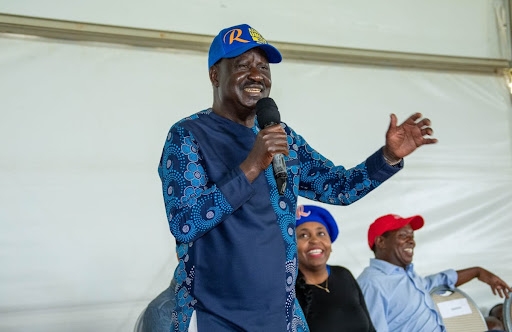The government is aware most boarding schools can become coronavirus infection hotspots and is seeking ways to avoid using them in January.
Some have overcrowded classrooms and congested and filthy dormitories where it would be difficult to mainain social distancing.
Others have no access to adequate clean running water for regular handwashing.
For some boarding schools, sick bays can only hold a few students in isolation and the nearest health facility is kilometres away.
Education CS George Magoha on Thursday told MPs the ministry will take drastic measures, including scrapping boarding facilities, to keep children safe.
Magoha said that the state was also considering localising teachers to schools within their villages as part of the measures.
It would mean primary and secondary school learners are integrated in institutions within their localities when schools resume.
The CS said the scrapping or suspending boarding facilities would be immediate if the Covid-19 curve will not have been flattened by January.
“Futuristically, we shall focus mainly on day schools. It will be difficult maintaining social distance in the cubicle of eight learners,” Magoha told the National Assembly's Committee on Education.
He said that learners will be issued with two reusable face masks to be worn at all times during their stay in schools.
“Every child will be provided with two masks which are washable; my concern is the safety of the children. The child must wear the mask,” he said.
Already, the ministry has engaged the National Youth Service, Rivatex and the Kitui County Textile Centre to supply the masks.
Officials estimate around 26 million face masks will be needed for both primary and secondary schools.
Magoha said teachers older than 58 years will need to be protected because they are more at risk of serious illness should they contract the virus.
“There are sizeable members who are over 58 years old... These senior people and we will ensure they are given duties that do not expose them to the virus,” he said.
The CS said more cash for schools' infrastructure will be needed as the existing facilities might not guarantee the required physical distance.
Some 431 learning institutions – mostly in urban areas – are also being used as both quarantine and isolation centres for Covid-19 patients.
“We have agreed for the time being that these centres should be evacuated a month to reopening and fumigated and sanitised 14 days before,” he said.
Magoha appeared before Parliament's Education committee to outline the ministry's plans for the reopening of schools next year.
Nominated MP and Kenya National Union of Teachers Knut secretary general Wilson Sossion sought answers on the boarding programmes.
Sossion wants children to attend schools within their locality and return home in the evening.
But the proposal to shelve boarding programmes in schools, or suspend them for the time being, met immediate opposition from secondary teachers.
Indimuli Kahi, the Kenya Secondary Heads Association chair, said schools act as safe havens for some learners and the move will put many in more danger.
"At the moment, the bulk of our learners are in day schools… let the government scale up all schools, equip them with infrastructure and necessary facilities and parents will scramble for day schools. It’s the only natural way to kill boarding schools,” Kahi said.
However, Kahi supported a regional admission policy of secondary schools to avert any future halt on the education system.
“We can have regional boarding schools moving forward especially in reflection to the new curriculum. The institutions can regulate the distance that admission is covering,” Kahi said.
In further preparations, teachers will be trained, starting with school heads, on basic coronavirus control before January reopening.
Magoha said it will be mandatory for all kitchen staff in all learning institutions to undergo regular coronavirus testing.
Meanwhile, the CS noted the plans to roll out community-based learning is at an advanced stage.
The programme will ensure that children who cannot access online learning are engaged with teachers in their locality until the schools reopen.
Magoha said that officers from Teachers Service Commission, Knec and, KICD are working on the guidelines to be issued to teachers.
The guidelines will spell out expectations of the unique programme.
“Those children are already living together and the teacher can teach them in that locality,” Magoha said when asked on how the ministry will ensure social distance is maintained.
In the early stages of the localised learning, teachers will offer lessons to learners under an arrangement similar to the Nyumba Kumi framework.
The Nyumba Kumi (10 households concept) was introduced in 2013 to anchor community policing at the household level.
The initiative is expected to begin in September and will involve the TSC, administrative officers, chiefs and elders and the Education ministry.
The CS came under fire, however, for what MPs called the ministry’s rigidity in adapting to the new normal.
MPs in the committee chaired by Busia Woman Representative Florence Mutua voiced concerns that Kenya was the only country in the world to scrap a whole calendar year.
They queried why modalities could not be put in place to have candidates sit for their national exams while observing the Covid-19 regulations.
“What if we don’t peak in January, are we going to scrap another year?” asked Ngunjiri Wambugu, Nyeri Town MP and vice chairman the committee.
But education adviser David Njengere said rushing transition would amount to pushing the problem to universities.
“We use KCSE results for selection of courses in universities and since a student had done only nine weeks [of the final year], on what basis are you going to guide a course, say, like medicine, having not covered a big proportion of biology in secondary?” he asked.
(edited by o. owino)











